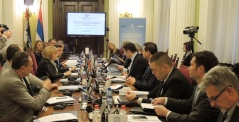National Assembly of the Republic of Serbia / Activities / Activity details

18 February 2016 Presentation of the European Health Consumer Index (EHCI) 2015 in Serbia
Friday, 19 February 2016
Presentation of European Health Consumer Index (EHCI) 2015 in Serbia
The National Assembly Economic Caucus, with the help of the National Alliance for Local Economic Development (NALED) and the Serbian Chamber of Commerce - Group of Pharmaceutical Wholesalers, organised the first presentation of the European Health Consumer Index (EHCI) 2015 in Serbia.
Greeting the attending, the Head of the Economic Caucus Prof. Dr Vladimir Marinkovic said he was pleased to see Serbia climb three places in the ranking of European healthcare systems since last year. Prof. Dr Vladimir Marinkovic opined that the results of the latest European Health Consumer Index in Serbia would give a clear view of the condition of the healthcare system in Serbia compared to other European countries and launch a discussion on reforms necessary to improve the quality of healthcare services and establish a sustainable and stable healthcare system both at the national and local level.
He thanked the representatives of NALED who had, with the help of the Serbian Chamber of Commerce - Group of Pharmaceutical Wholesalers, launched the “Health Initiative” within which they announced they would be cooperating toward improving healthcare legislation through the Economic Caucus and open dialogue with the economic sector, local self-governments, healthcare institutions, Ministry of Health and other key players.
Simo Vukovic of NALED congratulated the Ministry of Health on its efforts to improve Serbia’s healthcare ranking. Vukovic said that NALED had conducted research in 105 municipalities and discovered that healthcare contributions at the local level are very humble, and the lack of control and supervision has led to healthcare institutions accruing debts. He added that an adequate solution to overcome the blocking of healthcare institutions is actively being sought. Vukovic stressed that NALED will be working on a series of regulatory documents and amendments to the existing documents with the aim of boosting Serbia’s ranking on the healthcare system quality scale and availability of services for the patients.
Head researcher and Chairman of Health Consumer Powerhouse Dr Arne Bjornberg said that the European Health Consumer Index 2015 ranked Serbia as 30th of 35 healthcare systems according to the quality and availability of healthcare services, which is three places higher than last year.
Dr Arne Bjornberg presented the key recommendations for Serbia – to institute electronic healthcare services like Macedonia, and oblige hospitals to publish the results of their treatments. Another important recommendation is to raise the 12% margin which complicates the pharmacies’ business operations and, Dr Bjornberg added is one of the reasons for the excessive debts.
Dr Bjornberg said that out of 1000 possible points, Serbia won 554, and achieved the best results in the category “Patient rights and information”, scoring lowest, among other things, for poor prevention of smoking-related illnesses, blood pressure, cataract operations, kidney transplants, care for the elderly and corruption. Serbia ranked higher than Bulgaria, Romania, Albania, Poland and Montenegro, but lower than Slovenia, Croatia and Macedonia.
The general assessment of the EHCI 2015 is that European healthcare systems are progressing despite the aging population, migrant crisis and strict austerity measures. This is especially important for Serbia and the local self-governments which had in 2015 allocated a mere 0.8% of their budget on average for healthcare. Dr Bjornberg stressed that a management and control system should be established over the financial obligations assumed by healthcare institutions and their founders i.e. local self-governments.
Besides the Head of the Economic Caucus Prof. Dr Vladimir Marinkovic, the meeting was attended by members of the Economic Caucus and members of the Health and Family Committee, Committee Chairperson Prof. Dr Slavica Djukic Dejanovic, MPs Milan Petric and Prof. Dr Branko Djurovic, State Secretary at the Ministry of Health Prof. Dr Berislav Vekic, representatives of the Blood Transfusion Institute of Serbia, Serbian Chamber of Healthcare Institutions, Alliance of Patients Associations of Serbia, Dental Chamber of Serbia, Health Council of Serbia, pharmaceutical companies and private medical chambers.



